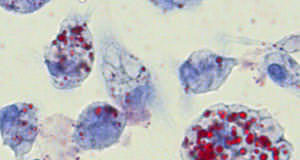Apple A Day Reduces Blood Levels Of Chemical Linked To Hardening...
Eating an apple a day might in fact help keep the cardiologist away, new research suggests. In a study of healthy, middle-aged adults, consumption of one apple a day for four weeks lowered by 40 percent blood levels of a substance linked to hardening of the arteries. Taking capsules containing polyphenols, a type of antioxidant found in apples, had a similar, but not as large, effect.
Hidden Stroke Impairment Leaves Thousands Suffering In Silence
Most people are completely unaware of one of stroke's most common, debilitating but invisible impairments, according to the first awareness survey of its kind in Canada released October 1 at the Canadian Stroke Congress. Thirty community volunteers trained by the York-Durham Aphasia Centre, a March of Dimes Canada program, collaborated with researchers from two Ontario universities in a survey of 832 adults in southern Ontario.
‘Cafeteria Diet’ Hastens Stroke Risk: High-Sugar, High-Salt Intake Creates ‘a Ticking...
The fat- and sugar-rich Western diet leads to a lifetime of health problems, dramatically increasing the risk of stroke or death at a younger age, according to a study presented October 1 at the Canadian Stroke Congress. Researchers found that a high-calorie, high-sugar, high-sodium diet nicknamed the 'cafeteria diet' induced most symptoms of metabolic syndrome -- a combination of high levels of cholesterol, blood sugar, blood pressure and obesity -- in rats after only two months.
New Way Of Fighting High Cholesterol Upends Assumptions
Atherosclerosis -- the hardening of arteries that is a primary cause of cardiovascular disease and death -- has long been presumed to be the fateful consequence of complicated interactions between overabundant cholesterol and resulting inflammation in the heart and blood vessels.
Melatonin And Exercise Work Against Alzheimer’s In Mice
The combination of two neuroprotective therapies, voluntary physical exercise, and the daily intake of melatonin has been shown to have a synergistic effect against brain deterioration in rodents with three different mutations of Alzheimer's disease.
Tai Chi Increases Brain Size, Benefits Cognition In Randomized Controlled Trial...
Scientists from the University of South Florida and Fudan University in Shanghai found increases in brain volume and improvements on tests of memory and thinking in Chinese seniors who practiced Tai Chi three times a week, reports an article published June 19 in the Journal of Alzheimer's Disease.
Yogurt Consumption, Blood Pressure, and Incident Hypertension
Adding more yogurt to your diet without increasing the number of calories you eat may help lower your risk of high blood pressure, according to new research presented at the American Heart Association's High Blood Pressure Research 2012 Scientific Sessions.
Clenching Left Hand Could Help Athletes Avoid Choking Under Pressure
Some athletes may improve their performance under pressure simply by squeezing a ball or clenching their left hand before competition to activate certain parts of the brain, according to new research published by the American Psychological Association.
Immune System Molecule Affects Our Weight
Researchers at the Sahlgrenska Academy, University of Gothenburg, Sweden, have identified a molecule in the immune system that could affect hunger and satiety. The researchers hope that new treatments for obesity will benefit from this finding.
Caffeine Boosts Power For Elderly Muscles, Experts Say
A new study to be presented at the Society for Experimental Biology meeting on 30th June has shown that caffeine boosts power in older muscles, suggesting the stimulant could aid elderly people to maintain their strength, reducing the incidence of falls and injuries.
Scientists Make Old Muscles Young Again In Attempt To Combat Aging
An international team of scientists have identified for the first time a key factor responsible for declining muscle repair during aging, and discovered how to halt the process in mice with a common drug. Although an early study, the findings provide clues as to how muscles lose mass with age, which can result in weakness that affects mobility and may cause falls.
Leptin May Play A Role in Hearing And Vision Loss, Zebrafish...
Leptin -- commonly dubbed the "fat hormone" -- does more than tell the brain when to eat. A new study by researchers at The University of Akron and Northeast Ohio Medical University (NEOMED) shows that leptin may play a role in hearing and vision loss. This discovery, made in zebrafish treated to produce low leptin, could ultimately help doctors better understand sensory loss in humans.
















